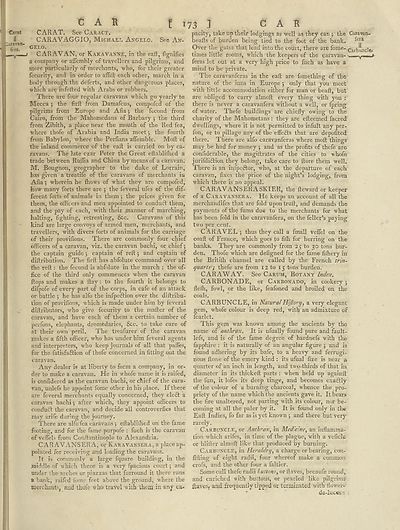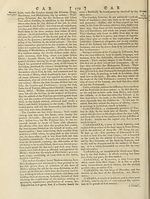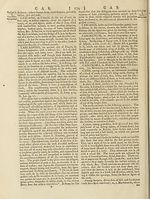Encyclopaedia Britannica, or, a Dictionary of arts, sciences, and miscellaneous literature : enlarged and improved. Illustrated with nearly six hundred engravings > Volume 5, BUR-CHI
(187) Page 173
Download files
Complete book:
Individual page:
Thumbnail gallery: Grid view | List view

CAK E173] CAK
CARAT. See Caract.
CARAVAGGIO, Michael Angelo. See An¬
gelo.
CARAVAN, or Karatanne, in the eaft, fignifies
a company or affembly of travellers and pilgrims, and
more particularly of merchants, who, for their greater
fecurity, and in order to aflift each other, march in a
body through the deferts, and other dangerous places,
which are infefted with Arabs or robbers.
There are four regular caravans which go yearly to
Mecca •, the fir ft from Damafcus, compofed of the
pilgrims from Europe and Afia j the fecond from
Cairo, from the Mahomedans of Barbary ; the third
from Zibith, a place near the mouth of the Red fea,
where thofe of Arabia and India meet; the fourth
from Babylon, where the Perfians afferuble. Moft of
the inland commerce of the call is carried on by ca¬
ravans. The late czar Peter the Great eftabliftred a
trade between Ruflia and China by means of a caravan.
M. Bougnon, geographer to the duke of Lorrain,
has given a treatife of the caravans of merchants in
Afia} wherein he ftiows of what they are compofed,
how many forts there are ; the feveral ufes of the dif¬
ferent forts of animals in them •, the prices given for
them, the officers and men appointed to conduct them,
and the pay of each, with their manner of marching,
halting, fighting, retreating, &c. Caravans of this
kind are large convoys of armed men, merchants, and
travellers, with divers forts of animals for the carriage
of their provifions. There are commonly four chief
officers of a caravan, viz. the caravan bachi, or chief;
the captain guide 5 captain of reft j and captain of
diftribution. The firft has abfolute command over all
the reft : the fecond is abfolute in the march : the of¬
fice of the third only commences when the caravan
flops and makes a ftay : to the fourth it belongs to
difpofe of every part of the corps, in cafe of an attack
or battle •, he has alfo the infpeftion over the diftribu¬
tion of provifions, which is made under him by feveral
diftributors, who give fecurity to the mafter of the
caravan, and have each of them a certain number of
perfons, elephants, dromedaries, &c. to take care of
at their own peril. The treafurer of the caravan
makes a fifth officer, who has under him feveral agents
and interpreters, who keep journals of all that paifes,
for the fatisfaftion of thofe concerned in fitting out the
caravan.
Any dealer is at liberty to form a company, in or¬
der to make a caravan. He in whofe name it is raifed,
is confidered as the caravan bachi, or chief of the cara¬
van, unlefs he appoint fome other in his place. If there
are feveral merchants equally concerned, they eleft a
caravan bachi; after which, they appoint officers to
conduct the caravan, and decide all controverfies that
may arife during the journey.
There are alfo fea caravans*, eftabliflred on the fame
footing, and for the fame purpofe : fuch is the caravan
of veffels from Conftantinople to Alexandria.
CARAVANSERA, or Karavansera, a place ap¬
pointed for receiving and loading the caravans.
It is commonly a large fquare building, in the
middle of which there is a very fpacious court 5 and
under the arches or piazzas that furround it there runs
a bank, raifed lome feet above the ground, where the
merchants, and thofe who travel w ith them in any ca¬
pacity, take up their lodgings as well as they can j the Caravan-
beafts of burden being tied to the foot of the bank. *era
Over the gates that lead into the court, there are fome- carbuncler
times little rooms, which the keepers of the caravan- • - v '
feras let out at a very high price to fuch as have a
mind to be private.
The caravanferas in the eaft are fomething of the
nature of the inns in Europe j only that you meet
wdth little accommodation either for man or beaft, but
are obliged to carry almoft every thing with you :
there is never a caravanfera without a well, or fpring
of water. Thefe buildings are chiefly owing to the
charity of the Mahometans : they are efteemed facred
dwellings, where it is not permitted to infult any per-
fon, or to pillage any of the effects that are depofited
there. There are alfo caravanferas where moft things
may be had for money j and as the profits of thefe are
confiderable, the magiftrates of the cities to whofe
jurifdiftion they belong, take care to ftore them well.
There is an infpe&or, who, at the departure of each
caravan, fixes the price of the night’s lodging, from
which there is no appeal.
CARAVANSERA SKIER, the fteward or keeper
of a Caravansera. He keeps an account of all the
merehandifes that are fold upon truft, and demands the
payments of the fums due to the merchants for what
has been fold in the caravanfera, on the feller’s paying
two per cent.
CARAVEL 5 thus they call a fmall veffel on the
coaft of France, which goes to fifh for herring on the
banks. They are commonly from 25 to 30 tons bur¬
den. Thofe which are defigned for the fame fiihery in
the Britifli channel are called by the French trin-
quarts-; thefe are from 12 to 15 tons burden.
CARAWAY. See Carum, Botany Index.
CARBONADE, or Carbonado, in cookery j
fleffi, fowl, or the like, feafoned and broiled on the
coals.
CARBUNCLE, in NaturalHi/lory^ a very elegant
gem, whofe colour is deep red, with an admixture of
fcarlet.
This gem was known among the ancients by the
name of anthrax. It is ufually found pure and fault-
lefs, and is of the fame degree of hardnefs with the
fapphire : it is naturally of an angular figure ; and is
found adhering by its bafe, to a heavy and ferrugi¬
nous ftone of the emery kind : its ufual fize is near a,
quarter of an inch in length, and two-thirds of that in
diameter in its thickeft parts : when held up againft
the fun, it lofes its deep tinge, and becomes exactly
of the colour of a burning charcoal, whence the pro¬
priety of the name which the ancients gave it. It bears
the fire unaltered, not parting with its colour, nor be¬
coming at all the paler by it. It is found only in the
Eaft Indies, fo far as is yet known j and there but very
rarely.
Carbuncle, or Anthrax, in Medicine, an inflamma¬
tion which arifes, in time of the plague, with a veficle
or blifter almoft like' that produced by burning.
Carbuncle, in Heraldry, a charge or bearing, con¬
fiding of eight radii, four whereof make a common
crofs, and the other four a laltier.
Some call thefe radii l uttons, or ftaves, becaufe round,
and enriched with buttons, or pearled like pilgrims
ftaves, and frequently tipped or terminated with flower-
‘ de-luces.-. ;
CARAT. See Caract.
CARAVAGGIO, Michael Angelo. See An¬
gelo.
CARAVAN, or Karatanne, in the eaft, fignifies
a company or affembly of travellers and pilgrims, and
more particularly of merchants, who, for their greater
fecurity, and in order to aflift each other, march in a
body through the deferts, and other dangerous places,
which are infefted with Arabs or robbers.
There are four regular caravans which go yearly to
Mecca •, the fir ft from Damafcus, compofed of the
pilgrims from Europe and Afia j the fecond from
Cairo, from the Mahomedans of Barbary ; the third
from Zibith, a place near the mouth of the Red fea,
where thofe of Arabia and India meet; the fourth
from Babylon, where the Perfians afferuble. Moft of
the inland commerce of the call is carried on by ca¬
ravans. The late czar Peter the Great eftabliftred a
trade between Ruflia and China by means of a caravan.
M. Bougnon, geographer to the duke of Lorrain,
has given a treatife of the caravans of merchants in
Afia} wherein he ftiows of what they are compofed,
how many forts there are ; the feveral ufes of the dif¬
ferent forts of animals in them •, the prices given for
them, the officers and men appointed to conduct them,
and the pay of each, with their manner of marching,
halting, fighting, retreating, &c. Caravans of this
kind are large convoys of armed men, merchants, and
travellers, with divers forts of animals for the carriage
of their provifions. There are commonly four chief
officers of a caravan, viz. the caravan bachi, or chief;
the captain guide 5 captain of reft j and captain of
diftribution. The firft has abfolute command over all
the reft : the fecond is abfolute in the march : the of¬
fice of the third only commences when the caravan
flops and makes a ftay : to the fourth it belongs to
difpofe of every part of the corps, in cafe of an attack
or battle •, he has alfo the infpeftion over the diftribu¬
tion of provifions, which is made under him by feveral
diftributors, who give fecurity to the mafter of the
caravan, and have each of them a certain number of
perfons, elephants, dromedaries, &c. to take care of
at their own peril. The treafurer of the caravan
makes a fifth officer, who has under him feveral agents
and interpreters, who keep journals of all that paifes,
for the fatisfaftion of thofe concerned in fitting out the
caravan.
Any dealer is at liberty to form a company, in or¬
der to make a caravan. He in whofe name it is raifed,
is confidered as the caravan bachi, or chief of the cara¬
van, unlefs he appoint fome other in his place. If there
are feveral merchants equally concerned, they eleft a
caravan bachi; after which, they appoint officers to
conduct the caravan, and decide all controverfies that
may arife during the journey.
There are alfo fea caravans*, eftabliflred on the fame
footing, and for the fame purpofe : fuch is the caravan
of veffels from Conftantinople to Alexandria.
CARAVANSERA, or Karavansera, a place ap¬
pointed for receiving and loading the caravans.
It is commonly a large fquare building, in the
middle of which there is a very fpacious court 5 and
under the arches or piazzas that furround it there runs
a bank, raifed lome feet above the ground, where the
merchants, and thofe who travel w ith them in any ca¬
pacity, take up their lodgings as well as they can j the Caravan-
beafts of burden being tied to the foot of the bank. *era
Over the gates that lead into the court, there are fome- carbuncler
times little rooms, which the keepers of the caravan- • - v '
feras let out at a very high price to fuch as have a
mind to be private.
The caravanferas in the eaft are fomething of the
nature of the inns in Europe j only that you meet
wdth little accommodation either for man or beaft, but
are obliged to carry almoft every thing with you :
there is never a caravanfera without a well, or fpring
of water. Thefe buildings are chiefly owing to the
charity of the Mahometans : they are efteemed facred
dwellings, where it is not permitted to infult any per-
fon, or to pillage any of the effects that are depofited
there. There are alfo caravanferas where moft things
may be had for money j and as the profits of thefe are
confiderable, the magiftrates of the cities to whofe
jurifdiftion they belong, take care to ftore them well.
There is an infpe&or, who, at the departure of each
caravan, fixes the price of the night’s lodging, from
which there is no appeal.
CARAVANSERA SKIER, the fteward or keeper
of a Caravansera. He keeps an account of all the
merehandifes that are fold upon truft, and demands the
payments of the fums due to the merchants for what
has been fold in the caravanfera, on the feller’s paying
two per cent.
CARAVEL 5 thus they call a fmall veffel on the
coaft of France, which goes to fifh for herring on the
banks. They are commonly from 25 to 30 tons bur¬
den. Thofe which are defigned for the fame fiihery in
the Britifli channel are called by the French trin-
quarts-; thefe are from 12 to 15 tons burden.
CARAWAY. See Carum, Botany Index.
CARBONADE, or Carbonado, in cookery j
fleffi, fowl, or the like, feafoned and broiled on the
coals.
CARBUNCLE, in NaturalHi/lory^ a very elegant
gem, whofe colour is deep red, with an admixture of
fcarlet.
This gem was known among the ancients by the
name of anthrax. It is ufually found pure and fault-
lefs, and is of the fame degree of hardnefs with the
fapphire : it is naturally of an angular figure ; and is
found adhering by its bafe, to a heavy and ferrugi¬
nous ftone of the emery kind : its ufual fize is near a,
quarter of an inch in length, and two-thirds of that in
diameter in its thickeft parts : when held up againft
the fun, it lofes its deep tinge, and becomes exactly
of the colour of a burning charcoal, whence the pro¬
priety of the name which the ancients gave it. It bears
the fire unaltered, not parting with its colour, nor be¬
coming at all the paler by it. It is found only in the
Eaft Indies, fo far as is yet known j and there but very
rarely.
Carbuncle, or Anthrax, in Medicine, an inflamma¬
tion which arifes, in time of the plague, with a veficle
or blifter almoft like' that produced by burning.
Carbuncle, in Heraldry, a charge or bearing, con¬
fiding of eight radii, four whereof make a common
crofs, and the other four a laltier.
Some call thefe radii l uttons, or ftaves, becaufe round,
and enriched with buttons, or pearled like pilgrims
ftaves, and frequently tipped or terminated with flower-
‘ de-luces.-. ;
Set display mode to:
![]() Universal Viewer |
Universal Viewer | ![]() Mirador |
Large image | Transcription
Mirador |
Large image | Transcription
Images and transcriptions on this page, including medium image downloads, may be used under the Creative Commons Attribution 4.0 International Licence unless otherwise stated. ![]()
| Permanent URL | https://digital.nls.uk/192986700 |
|---|
| Attribution and copyright: |
|
|---|
| Description | Ten editions of 'Encyclopaedia Britannica', issued from 1768-1903, in 231 volumes. Originally issued in 100 weekly parts (3 volumes) between 1768 and 1771 by publishers: Colin Macfarquhar and Andrew Bell (Edinburgh); editor: William Smellie: engraver: Andrew Bell. Expanded editions in the 19th century featured more volumes and contributions from leading experts in their fields. Managed and published in Edinburgh up to the 9th edition (25 volumes, from 1875-1889); the 10th edition (1902-1903) re-issued the 9th edition, with 11 supplementary volumes. |
|---|---|
| Additional NLS resources: |
|

